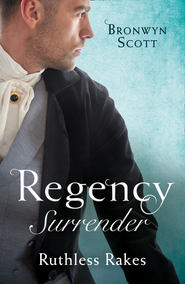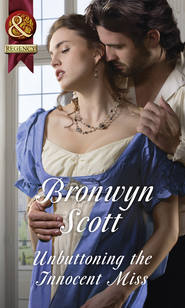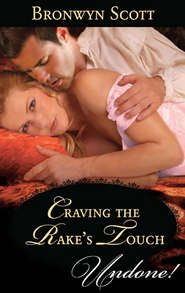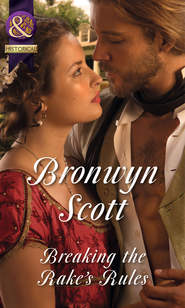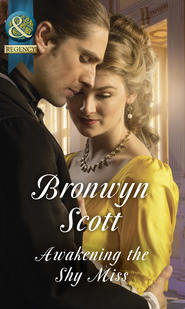По всем вопросам обращайтесь на: info@litportal.ru
(©) 2003-2024.
✖
The Secrets Of Lord Lynford
Автор
Год написания книги
2019
Настройки чтения
Размер шрифта
Высота строк
Поля
It would not be the first time he’d taken a lover for such a purpose. His own lovers were women of the world who enjoyed time with him until it suited them both to move on to new experiences, new adventures. But it was the first time he’d wanted to do so with such covetousness. It was not the usual reaction he generally had towards his lovers. The intensity of that emotion must have showed in his gaze for in the next moment, Eliza Blaxland suddenly rose and made excuses to leave with far less fluency than she’d delivered her speech. ‘I ought to go, it’s getting late.’
Was she looking for an invitation to stay? It didn’t sound like a question. It sounded like a decision. He hadn’t believed she’d be a runner, but she showed every sign of wanting to do just that. How interesting. If she wasn’t running from him, that only left the option of running from herself. Was she running from her reaction to the attraction that simmered between them? Did this flame that sparked between them unnerve her? How intriguing that the unflappable Mrs Blaxland could be unnerved by the nascent overtures of a flirtation when barging in on a man unannounced hadn’t flustered her at all. But she’d been in control then. She’d been the one to do the barging.
‘Leave? Surely you don’t mean to return to Truro tonight?’ The protectiveness he’d felt in the grand salon surged again. He didn’t like the thought of her out on the dark Cornish roads. It was three hours on the road in daylight between Truro and Porth Karrek. A man could do the trip in a day on horseback, but it was a long day and a lonely one. Cornwall was full of wide, empty spaces, especially when one’s wheel or axle gave out. She’d be miles from any help if there was need.
‘I have rooms at the inn by the harbour. I need to visit one of my mines early tomorrow and then return to Truro. I’ve been gone from home for three days already and I am eager to return. Thank you for the evening.’ Such eagerness prompted the question of who or what was waiting for her? A lover? Was she already otherwise engaged? Was that the reason she was so fluttery now? Covetousness flared alongside his protectiveness.
‘Perhaps I shall see you in Truro. I often have business there.’ Eaton thought he might find a little more business in Truro. Cassian was in Truro, working on plans for his amusement gardens. Perhaps a visit was in order once the term started here and Cade no longer needed him. ‘Or should I be expecting any more surprise inspections?’
Her fan tapped his sleeve. ‘They wouldn’t be surprises if you expected them, my lord.’
‘Call me Eaton, please. There’s no need to stand on ceremony.’ He made the bold offer spontaneously, his earlier urgency surging to the fore once more. He did not want to be ‘my lord’ or ‘Lord Lynford’ with her; he wanted to be something more intimate, more personal, something that would separate him from any other who attempted to claim her attentions. It was the fanciful wish of a schoolboy with a crush. He reached for her hand, bending over it. ‘You were a delightful hostess tonight, surely you’ve earned the right to address me more informally.’ He could count on one hand the people who had that right: Cassian, Inigo, Vennor, their fathers, of course. He didn’t need both hands for that count now. He pushed back the grief that managed to edge its way to the surface at the oddest times and in the oddest ways.
‘I was pleased to be of service. I hope the term begins splendidly. I’ll be looking forward to Mr Kitto’s reports on the students’ progress. If weather permits, I might make the journey for the Christmas concert.’
He doubted her on both accounts. ‘Don’t lie to me, Mrs Blaxland. You did not want to give that speech tonight and the weather in December is too questionable.’
‘I was being polite.’ She withdrew her hand in a deliberate gesture.
‘I prefer you be honest.’ Eaton felt disappointed at the prospect of her leaving. How could he unravel her mysteries if she was three hours away? Already he was devising reasons why he might call her back. He might need her counsel on the school, for instance; they might want to discuss her own schools in person rather than through correspondence and, when that was done, he might take her truffle hunting in the Trevaylor Woods. Eaton leaned close, breathing in the peach-and-vanilla summer scent of her, his mouth near her ear as if imparting a secret. ‘And in the spirit of being honest, Eliza, I find you to be a complete revelation.’
‘I assure you, I am quite ordinary.’ But the words pleased her. He heard her breath catch despite her cool response and she hadn’t corrected him on the use of her first name, proof that this encounter, this response, was not ordinary for her, that he was not ordinary to her.
‘Then we must agree to disagree since I find nothing plain about you.’ Eaton let his gaze hold her eyes, let her see the interest she raised in him. They were both experienced adults. They needn’t play coy games. He would be honest, too. He did not want the conversation to end. ‘I’ve been wrong about you from the start. I thought you’d be older.’ He gave a low chuckle. ‘It seems we have that mistake in common.’
‘My husband was considerably older than I. It is a common assumption.’
‘If you’d not come to the open house, I might never have known.’
‘What difference did my age make when we corresponded about the school? What difference did my age make to my donations? My age is of no import.’
‘Huntingdon Blaxland was sixty-five when he died.’ Eaton remembered his father noting it one morning over breakfast and newspapers. His father had commented that Blaxland’s death would leave a gap in the mining industry, a power vacuum. Eaton had assumed his widow was of a commensurate age. Never had he imagined Blaxland’s widow was in her thirties.
‘Yes, and he was fifty-five when we married. I was his second wife, of course, his first having died a few years before.’ Perhaps that was why he’d thought Mrs Blaxland would be older. He’d not realised the first wife had passed; he would have been a child, after all. It was hardly the sort of news an adolescent paid attention to, even if he hadn’t been recovering from the throes of his own illness. But now, it was like finding a pearl in an oyster and Eaton filed the precious knowledge away along with the champagne. It was the most personal piece of information she’d offered. His collection of facts was growing: she was a widow, a second wife; she was confident, strong, stubborn and direct; she was young, attractive; she liked to be in control.
She was asserting that desire now, perhaps sensing the conversation was fast slipping beyond her ability to command it. ‘I fail to see what consequence any of this holds. It doesn’t matter.’ But it did. She wasn’t as sure of herself as she wanted him to believe. Did she think he didn’t see the flutter of her pulse in the lantern-lit darkness, or the way her eyes met his and then slid away? She wanted to know, as much as he did, what it would be like if they acted on the spark that jumped between them when they argued, when they challenged one another, when they were merely in the same room together. He’d been aware of her tonight long before he’d gone to her. He’d been aware, too, that she’d been looking for him the moment she’d arrived.
What could it hurt to find out? She lived miles away and was hardly in the habit of haring down to Porth Karrek.
‘It does matter.’ He slipped his hand behind her neck, drawing her close, letting his gaze linger, letting the proximity of his body signal his intentions as he murmured, ‘I am not in the habit of kissing grandmothers.’
‘And I am not in the habit of—’
Eaton didn’t let her finish. He captured her lips, sealing her rejoinder with his mouth. They could discuss her habits—or lack of them—later.
Chapter Four (#uc30a7955-fd78-5bef-ad82-451bb9ff76f8)
Apparently, she was not in the habit of completing her sentences. She certainly wouldn’t be capable of doing so now. All her mind could focus on was that he was kissing her. The realisation rocketed through Eliza, a bolt of white-hot awareness. There wasn’t a single part of her that wasn’t aware of him—the sweet, sharp autumn scent of him in her nostrils, the feel of his touch on the bare skin at her neck, the press of his mouth against hers—all combining to stir her to life, perhaps for the first time.
His tongue teased hers; a slow, languorous flirt confident of its reception. His hand adjusted its position at her neck, tilting her mouth, deepening his access to her until she gave a little moan. She had never been kissed like this, as if the kiss was a seduction within itself, as if every nuance of mouth and tongue and lips communicated a private message of desire designed just for her. She felt herself wanting to give over; there was no question of resistance, no desire for it. She wanted this kiss, wanted to fall into it, wanted to see where it led. Perhaps it led to other wicked desires, other wicked feelings. But only if she let it—and she wouldn’t, she promised herself.
All the reasons why began to reassert themselves, slowly coming back to the fore of her defences after the initial onslaught of this new pleasure. She shouldn’t be kissing a stranger, a man she’d only met once. She shouldn’t be kissing a man with whom she meant to do business. She was a mother; she had to think of her reputation for her daughter’s sake. She was a business owner; she also had to think of her reputation for the sake of the mines. Kisses were for women who could afford them.
The last thought brought her up short. She pushed against the hard wall of his chest. Did he think she could afford to give away kisses? That she’d come out to the garden on purpose to signal her intention—that she was willing to acknowledge and act on the flicker of attraction? Had he taken what she’d intended as an escape as an invitation instead?
The white-hot burn of pleasure turned to heated mortification. ‘My lord...’ She should have been more astute. Widows often had a reputation for discreet licentiousness. The widows the Marquess of Lynford knew most certainly did. But she could not be one of them. It was for that very reason she’d been so careful of her own reputation for five long years. ‘I fear I have given you a most inaccurate impression of myself. I apologise, sincerely. I must go. Immediately.’ Eliza tried to step around him, but all the height and breadth she’d appreciated about him earlier worked to her disadvantage. He was not a man easily evaded. She should have left when she had the chance. She should not have lingered in the garden, tempting fate. She’d come out thinking to put some distance between herself and those dark eyes. But the garden hadn’t been far enough.
He moved, subtly positioning his body to block her departure, a hand at her arm in gentle restraint, his voice soft in the darkness. ‘When will I see you again?’ It was ‘will’ with him, not ‘may’. Lynford wasn’t the sort of man to beg for a woman’s attention. He went forward confidently, assuming the attention would be given. Will. The potency of that one word sent a frisson of warm heat down her spine. His dark gaze held hers, intent on an answer—her answer. Despite his confident assumptions, he was allowing that decision to be all hers.
‘I don’t think that would be wise. Business and pleasure should not mix.’ She could not relent on this or she would come to regret it. An affair could ruin her and everything she’d worked for. The shareholders in the mines would no doubt love to discover a sin to hold against her.
‘Not wise for whom, Mrs Blaxland?’ The back of his hand traced a gentle path along the curve of her jaw. ‘You are merely a patron of the school I sponsor. I don’t see any apparent conflict of interest.’
‘Not wise for either of us.’ If she stood here and argued with him, she would lose. Sometimes the best way to win an argument was simply to leave. Eliza exercised that option now in her firmest tones, the ones she reserved for announcing decisions in the boardroom. ‘Goodnight, Lord Lynford.’ She was counting on him being gentleman enough to recognise a refusal and let her go this time, now that any ambiguity between them had been resolved.
Eliza made it to the carriage without any interference. She shut the door behind her and waited for a sense of relief to take her. She’d guessed correctly. Lynford hadn’t followed her and it was for the best. He was probably standing in the garden, realising it at this very minute, now that the heat of the moment had passed. The kiss had been an enjoyable adventure. It had added a certain spice to the evening, but it was not to be repeated. He didn’t know her. He didn’t know the depth of her responsibilities, or that she had a child—Sophie—the true love of her life.
If he did, he’d most certainly run. A man like Lynford, a man in his prime with wealth and a title to recommend him, was expected to wed a young woman capable of giving him his own heirs. She knew precisely the sort of bride who was worthy of a ducal heir: a sweet, young girl, who had no other interests than stocking her husband’s nursery. Lynford would want, would need, a family of his own. All dukes did. The Marquess would never seriously consider a woman with another man’s daughter clinging to her skirts and who spent her days running a mining empire, any more than she would consider him as a husband.
She would never marry again. She had no inclination to give up her hard-won control over her future and her daughter’s. The risk was too great, even if the cost was also great. Sophie must come first, ahead of her own personal wishes for a family. Eliza had come to such a realisation early in her widowhood and it had been both a relief and a disappointment.
It was the only thing the doting and decent Blaxland hadn’t been able to give her and the only thing she would not risk giving to herself. He’d given her security and a future, but he could not give her a family. Despite ten years of marriage, there was only to be her darling Sophie between them. Another husband, another man, younger, more virile, might provide her with those children, but she did not want to turn her responsibilities over to a husband in exchange, nor could she risk her reputation with the entanglement of a lover. The well-intentioned overture from Miles Detford years ago had shown her how even the smallest misstep could weaken her position.
On either front, she had no business kissing the Marquess of Lynford in the academy gardens. She was the daughter of a mine owner, the widow of a mine owner. Her family came from business. Cits on all sides, including her late husband’s. Such a background wasn’t for a marquess. Eliza knew how the world worked. She could be nothing for him but a brief dalliance until whatever mystery he saw in her was solved. Men could do as they liked. But she would never outrun the stain and neither would Sophie.
That was the lesson she told herself as her coach deposited her at the inn. But it didn’t stop her from dreaming that night of a dark-eyed man who’d called her extraordinary and kissed her body into an acute awareness of itself, who’d made her feel alive in ways she hadn’t felt for years, perhaps ever. There simply hadn’t been time or place for such realisations. There still wasn’t. Whatever that kiss had awakened had to be suppressed. That kiss could stay in her dreams, but it could go no further. In the morning she would wake up, visit the Porth Karrek mine and return to life as usual. As earth-shattering as tonight had been, it simply couldn’t be any other way for her.
It simply couldn’t be this way. The lumber order for the tunnel timbers was excessive. Eliza sat back from the ledgers, hazarding a glance at the clock on the wall of the mine office. It was eleven already. The morning had slipped away while she’d grappled with the receipt, trying to make sense of the overabundance of ordering. She’d meant to leave for home by now and she was nowhere close to making that self-imposed departure. If she left it any later, she’d miss tea with Sophie. She’d promised she’d be back in time and she never broke a promise. But ultimately, she was the one who had to answer to the shareholders in a few weeks at the annual meeting, the one who would be accountable for this over-ordering.
Eliza went to the window and looked down on the bustling scene below: carters pushing wheelbarrows of ore from the mine to the sorters; sorters separating the ore; her foreman, Gillie Cardy, shouting orders. The sight of her mines at work brought a certain thrill, a certain proof that she’d accomplished something. She caught Gillie’s eye and gestured for him to come up. He would know why so much lumber had been ordered.
Gillie knocked on the door before entering, sweeping off his knit cap as he stepped inside. ‘Mrs Blaxland, how can I be of service?’ She liked Gillie. He’d been the site manager even before her husband died. He was competent and knew the mechanics of mining thoroughly, and he’d been a friendly face when she’d first taken over.
She motioned towards the ledgers. ‘I have some questions about the lumber order.’
Gillie chuckled and shook his head. ‘I’m no good at numbers, ma’am. I just do what I’m told. You want someone to find a lode in the mine, I’m your fella. But if you want someone to do the books, that’s not me. I know mining and not much else.’ Eliza nodded. This was yet another reason her schools were vital. People needed mathematics and reading skills no matter what their profession. Education was power and protection. Without it, people were waiting to be victims.
‘I’ve done the sums,’ she assured him. ‘With the amount of timber ordered we could build a tunnel twice the length.’
He twisted the cap in his hand, looking worried. ‘The tunnel is very long, ma’am. We are tunnelling out underneath the ocean.’
Eliza stared at him in disbelief. ‘We are not! We opted not to take the risk at this time.’ Her stomach began to turn. The board had decided at the last quarterly meeting not to go that far.
‘Pardon me, ma’am, but Mr Detford said we were tunnelling under the ocean.’
Miles Detford? He ran the Wheal Karrek mine for her. She trusted Detford, counted him as friend. Miles would never go against the board’s decision or her wishes. He knew how she felt about the dangers of tunnelling beneath the ocean. Surely, there must be some mistake, that Cardy had misunderstood or that Miles Detford had been pressured by someone, because if that wasn’t the case, it meant she had misunderstood—not just the decision not to tunnel, but so much more. Her board was willing to override her decisions.
If it were true, it was a slap in the face. Someone thought she wouldn’t notice, either because she wasn’t diligent or because they thought she wasn’t smart enough. The other answer was even less appealing. Maybe whoever ordered the timbers simply didn’t care if she noticed. Her wishes were to be overridden. Not everyone on the board had agreed about the tunnel. It had been contentious and hotly debated. She’d rather put the money towards mining schools. Others had not felt that way. There was no money to be made from the schools.







